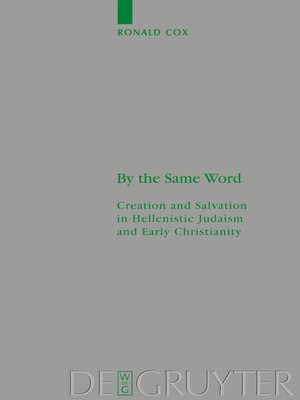By the Same Word
ebook ∣ Creation and Salvation in Hellenistic Judaism and Early Christianity · Beihefte zur Zeitschrift für die neutestamentliche Wissenschaft
By Ronald Cox

Sign up to save your library
With an OverDrive account, you can save your favorite libraries for at-a-glance information about availability. Find out more about OverDrive accounts.
Find this title in Libby, the library reading app by OverDrive.



Search for a digital library with this title
Title found at these libraries:
| Library Name | Distance |
|---|---|
| Loading... |
Middle Platonism explained how a transcendent principle could relate to the material world by positing an intermediary, modeled after the Stoic active cause, that mediated the supreme principle's influence to the world while preserving its transcendence. Having similar concerns as Middle Platonism, Hellenistic Jewish sapientialism, early Christianity, and Gnosticism appropriated this intermediary doctrine as a means for understanding their relationship to God and to the cosmos. However, these traditions vary in their adaptation of this teaching due to their distinctive understanding of creation and humanity's place therein. The Jewish writings of Philo of Alexandria and Wisdom of Solomon espouse a holistic ontology, combining a Platonic appreciation for noetic reality with an ultimately positive view of creation and its place in human fulfillment. The early Christians texts of 1 Cor 8:6, Col 1:15-20, Heb 1:2-3, and the prologue of John provide an eschatological twist to this ontology when the intermediary figure finds final expression in Jesus Christ. Contrarily, Poimandres (CH 1) and the Apocryphon of John, both associated with the traditional rubric "Gnosticism", draw from Platonism to describe how creation is antithetical to human nature and its transcendent source.







